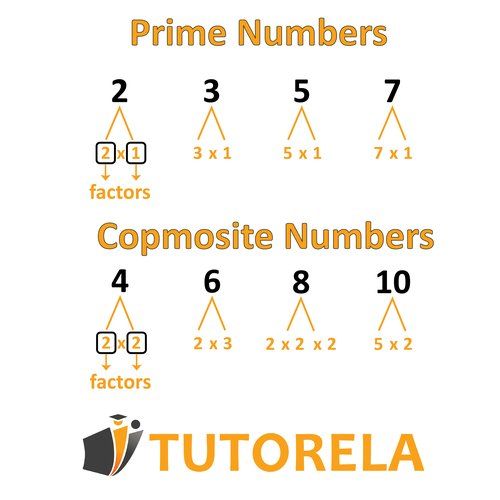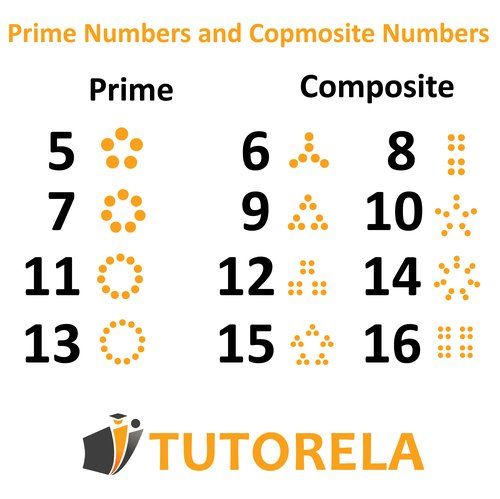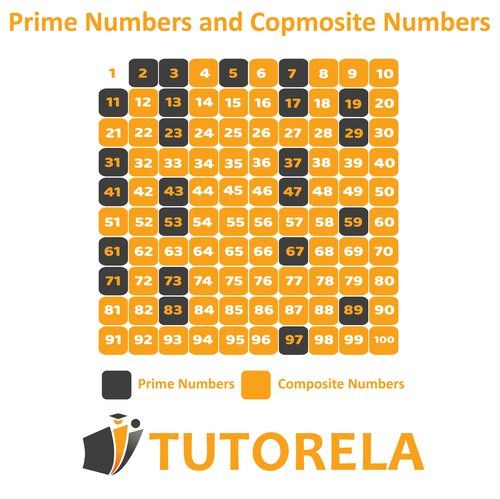A prime number is a natural number that is divisible only by itself and by .
Prime Numbers and Composite Numbers
Definitions of Prime Numbers and Composite Numbers
Prime number
Composite number
A composite number is a number that can be written as the product of two natural numbers smaller than it, with the exception of and itself.
The number –> is a special number that is neither prime nor composite.
The number –> is the only even number that is prime.

Test yourself on prime numbers and composite numbers!
Is the number equal to \( n \) prime or composite?
\( n=10 \)
What are prime numbers and composite numbers?
In this article, we will describe what exactly prime and composite numbers are; we will learn to identify them and get to know special numbers.
What is a prime number?
A prime number is a natural number divisible only by itself and by .
This means that, when we talk about a prime number, we cannot find any other two numbers besides itself and , that when multiplied together give us that number as a product.
For example: the number
is a prime number. It can be divided only by and by .
Even if we want to write it as a multiplication, this will only be with the factors and and not with natural numbers smaller than it.
Another example: the number
This number is divisible only by itself and by and we cannot write it as the product of two natural numbers smaller than it, except for and .
Is the number equal to \( n \) prime or composite?
\( n=20 \)
Is the number equal to \( n \) prime or composite?
\( n=22 \)
Is the number equal to \( n \) prime or composite?
\( n=36 \)
What is a composite number?
A composite number is a number that can be written as the product of two natural numbers smaller than it, except for and itself.
A composite number can be expressed as the product of itself and clearly, but always with two other factors that do not equal .
For example: the number
is a composite number. It can be represented as the product of and .
Another example: the number
is a composite number. can be represented as the product of and .

In summary
When you need to determine if a certain number is prime or composite, ask yourself:
Is said number divisible by other divisors besides itself and ? Can we represent it as the product of natural numbers smaller than it, outside of and the number itself?
If the answer is yes the number is composite
If the answer is no the number is prime
Valuable fact: Every even number is composite, except for .

Exercises on Prime or Composite Numbers
Determine if the following numbers are prime or composite:
The number
Solution: is a prime number. It can only be represented as the product of and .
The number
Solution: The number is prime. It can only be represented with the natural numbers and .
The number
Solution: The number is composite. It can be represented as the product of and , or and .
Pay attention –> The number can also be represented as the product of factors –>
and, clearly, it is considered composite.
Is the number equal to \( n \) prime or composite?
\( n=42 \)
Is the number equal to \( n \) prime or composite?
\( n=4 \)
Is the number equal to \( n \) prime or composite?
\( n=8 \)
Special Numbers
Now we are going to introduce you to some very special numbers! Numbers that might make you think more than once before you can determine if they are prime or composite:
The number –> Is neither prime nor composite.
The number Is divisible only by which, in fact, is itself. It can only be represented through the multiplication of and , making it a number that is neither prime nor composite.
The number –> is prime.
can be divided only by itself and by this makes it a prime number as dictated by its definition.
So why is it considered special?
All even numbers are composite except for ! All even numbers are divisible by and another number. But, when it itself is , that's another matter.
More exercises
Determine if the following numbers are prime or composite:
The number
Solution: it is a composite number. It can be represented as the product of and .
The number
Solution: it is a prime number. It is divisible only by and itself.
The number
Solution: it is a composite number. It can be represented as the product of and .
The number
Solution: it is a prime number. It is divisible only by and itself.
Examples and exercises with solutions of prime numbers and composite numbers
Exercise #1
Is the number equal to prime or composite?
Video Solution
Step-by-Step Solution
A number is classified as prime if it has exactly two distinct positive divisors: 1 and itself. Conversely, a number is composite if it has more than two divisors.
Given the number , we need to determine whether it is prime or composite.
Let's test the divisibility of 10 by numbers other than 1 and 10:
- Check divisibility by 2: Since 10 is an even number, it is divisible by 2. Specifically, with no remainder.
- Check divisibility by 3: , which is not an integer, hence not divisible.
- Check divisibility by 5: with no remainder, showing divisibility by 5.
Since 10 is divisible by numbers other than 1 and itself (specifically 2 and 5), it is not prime. Therefore, the number 10 is composite.
In conclusion, the number 10 is a composite number.
Answer
Composite
Exercise #2
Is the number equal to prime or composite?
Video Solution
Step-by-Step Solution
To determine if is prime or composite, we need to examine its divisors.
- Step 1: Identify divisors of 20, other than 1 and 20 itself.
Since 20 is an even number, it is divisible by 2. So, 2 is a divisor of 20. - Step 2: Check divisibility by other small numbers:
- 20 divided by 4 equals 5 (another divisor).
- Additionally, , confirming 5 is also a divisor.
Since 20 has divisors other than 1 and itself (including 2, 4, and 5), it is not a prime number.
Therefore, the number is Composite.
Answer
Composite
Exercise #3
Is the number equal to prime or composite?
Video Solution
Step-by-Step Solution
To determine if the number 19 is prime, follow these steps:
- Step 1: Check if the number is greater than 1. Since , proceed to the next step.
- Step 2: Identify potential divisors for 19 by considering integers from 2 up to .
The square root of 19 is approximately 4.36, and thus we test divisibility by integers 2, 3, and 4.
- 19 divided by 2: The quotient is not an integer (it gives 9.5).
- 19 divided by 3: The quotient is not an integer (it gives 6.333...).
- 19 divided by 4: The quotient is not an integer (it gives 4.75).
None of these divisions result in an integer, meaning 19 has no divisors other than 1 and 19 itself.
Therefore, the number 19 is prime.
Answer
Prime
Exercise #4
Is the number equal to prime or composite?
Video Solution
Step-by-Step Solution
To determine if the number is prime or composite, we will follow these steps:
- Step 1: Understand the definitions.
A prime number is a natural number greater than 1 that has no positive divisors other than 1 and itself. A composite number has additional divisors. - Step 2: Identify divisors of 4.
We list out the divisors of 4, starting from 1: They are 1, 2, and 4. - Step 3: Analyze the divisors.
The number 4 has more than two divisors: 1, 2, and 4. This means it can be divided by numbers other than 1 and itself.
Conclusion: Since 4 has divisors other than 1 and itself (specifically, it is divisible by 2), it is not a prime number. Therefore, 4 is classified as a composite number.
Therefore, the solution to the problem is Composite.
Answer
Composite
Exercise #5
Is the number equal to prime or composite?
Video Solution
Step-by-Step Solution
To determine whether 36 is a prime or composite number, we need to check if it has divisors other than 1 and 36:
- Step 1: Calculate the square root of 36, which is 6. This means we only need to test divisibility by numbers up to and including 6.
- Step 2: Check divisibility by 2. Since 36 is an even number (divisible by 2), it has a divisor other than 1 and itself.
Therefore, since 36 is divisible by 2 (and also by other numbers such as 3, 4, and more), it has divisors other than just 1 and 36. This means it cannot be a prime number.
Conclusively, the number 36 is Composite.
Answer
Composite
Is the number equal to \( n \) prime or composite?
\( n=7 \)
Is the number equal to \( n \) prime or composite?
\( n=17 \)
Is the number equal to \( n \) prime or composite?
\( n=19 \)
More Questions
Prime Numbers and Composite Numbers
- Long Division
- Estimation for Fifth Grade
- Divisibility Rules for 3, 6, and 9
- Average for Fifth Grade
- Vertical Multiplication
- Fractions
- A fraction as a divisor
- How do you simplify fractions?
- Simplification and Expansion of Simple Fractions
- Common denominator
- Hundredths and Thousandths
- Part of a quantity
- Placing Fractions on the Number Line
- Numerator
- Denominator
- Decimal Fractions
- What is a Decimal Number?
- Reducing and Expanding Decimal Numbers
- Addition and Subtraction of Decimal Numbers
- Comparison of Decimal Numbers
- Converting Decimals to Fractions
- Remainder of a fraction
- Decimal fraction remainder
- Remainders









